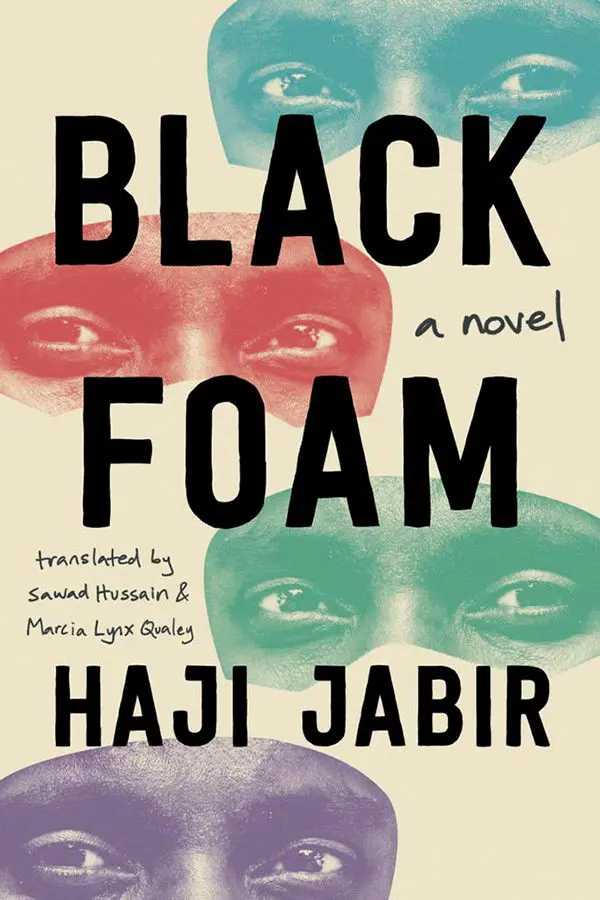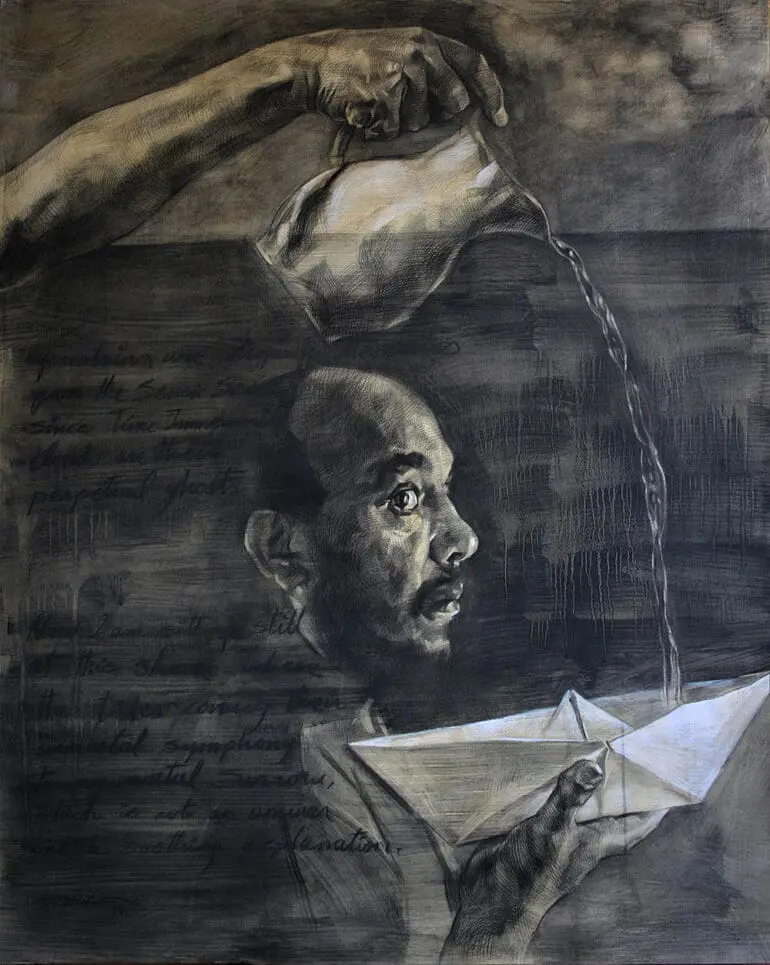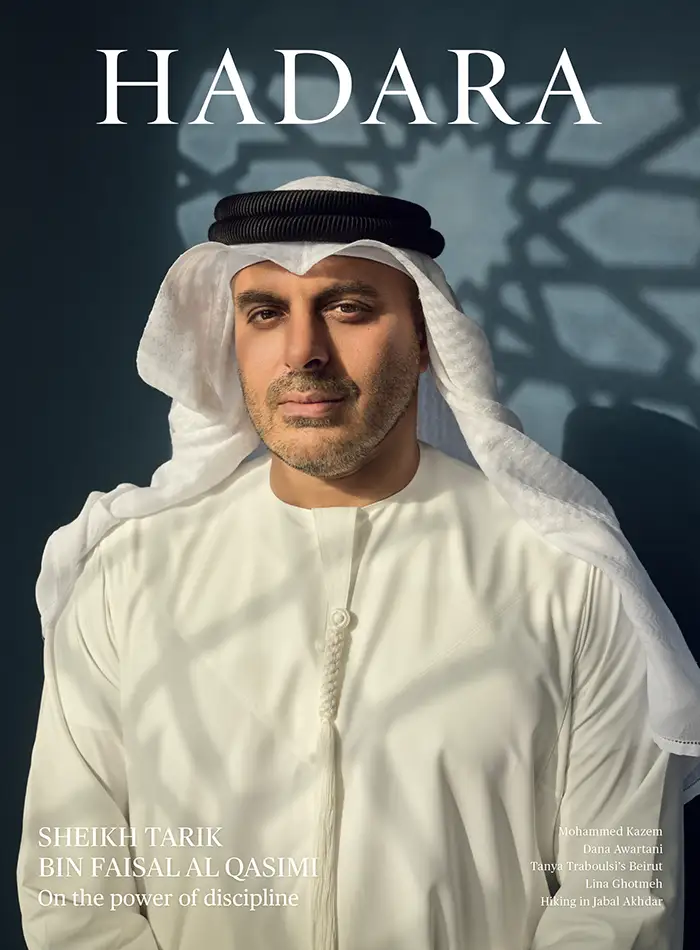Forever an outsider
The first Eritrean novel to be longlisted for the International Prize for Arabic Fiction, Black Foam by Haji Jabir follows a young Eritrean misfit as he searches for a place in the world.
By Marcia Lynx Qualey
Illustration by Ermias Ekube
Haji Jabir’s Black Foam is less about an individual coming of age than a search for community. The novel, Jabir’s second and the first by an Eritrean to be on the International Prize for Arabic Fiction’s long list, in 2019, follows a protagonist whose name and religious identity shift as he looks for a community that will accept him. He searches first in Eritrea, then in a refugee camp over the border in Ethiopia, next in a minority Jewish community in Ethiopia, and finally in Israel and Palestine. The young man—alternately Adal, Dawoud, David, and Dawit—is in search of somewhere he can not only feel safe but also join the heart of a community, so that he no longer feels like “black foam” that floats on the surface of the world.
Jabir is familiar with the feeling of life at the periphery. He grew up in Saudi Arabia after his family fled the war in Eritrea and was unable to attend school as a boy because he lacked the right papers. “I was past 10 when [my mother] got my papers and enrolled me to study,” Jabir says, “and I began my journey in learning to read and write.” His mother took adult-literacy classes in parallel with him. His first novel, Samrawit, explores these challenges, with a protagonist who returns to Eritrea and struggles to belong.
The central character in Black Foam is not so fortunate as to have a loving mother to learn alongside him. He is born on the battlefield during Eritrea’s war for independence (1961-1991), a “fruit of the struggle” baby who has neither father nor mother, but is raised collectively by women soldiers. It is both a privileged identity—his education will be covered by the state—and an outsider one. When, as a teen, he joins the victory celebrations in Asmara, he falls for a girl named Aisha. But he soon realises she looks down on fruit of the struggle kids, and, to woo her, he must hide his identity. Since the name Adal, a battle early in the war, would give him away, he calls himself Dawoud. With Aisha, he finds a fragile and momentary belonging, keeping his two lives separate.

The idea for the novel came to Jabir in 2015, he says, when he was working as a journalist and was “deeply affected by the Israel Defense Forces’ killing of an Eritrean immigrant.”
But the narrator’s tangled identities constantly crash into one another. By the time we hear the story about Aisha, our main character has already become David, a name he assumes in a resettlement camp in Ethiopia, as he believes a Christian name will give him a better chance at resettlement in a European country. When that doesn’t work, he assumes the plan of another refugee, Yohannes, and makes his way to Gondar, where a group of Falasha Mura Jews—Ethiopian Jews who were converted to Christianity by European missionaries—is preparing to emigrate to Israel. At this point, he takes on a fourth identity, Dawit, in order to scam his way in.
The idea for the novel came to Jabir in 2015, he says, when he was working as a journalist and was “deeply affected by the Israel Defense Forces’ killing of an Eritrean immigrant.” The killing was accidental, Jabir says, in that “they thought they were shooting at a Palestinian whom they’d been chasing.” Jabir was affected not only by the man’s death, “but also by the reactions that followed, which belittled and even ridiculed the news, because the dead man was an undocumented migrant.”
In the aftermath of this news, Jabir poured his grief and rage into a long article, but “that wasn’t enough to exhaust my emotions,” he says, and he decided to write a novel for the murdered Eritrean man, Habtom Zarhum.
To do so, Jabir knew he would need to do a lot of research, since he didn’t want the novel to be an “angry screed,” but rather a complex exploration of character and belonging. He watched long hours of documentaries about the Falasha Mura, read witness testimonies, and scoured book fairs for texts about migrants to Israel. Finally, he got a chance to cross from Jordan into Ramallah, and from there to visit Jerusalem, where a large part of the novel is set.
“It so happened that the passport officer at the border crossing with Jordan was a Falasha Jew. At the time, I addressed him as an Israeli, while he spoke to me as an Ethiopian,” Jabir says, noting that the man seemed to believe the Ethiopian occupation of Eritrea—which ended in 1991—was still ongoing. This conversation and others, he says, “helped me understand the psychological state in which the Falasha Jews live in Israel.”
He also spent time meeting with Sudanese migrants to Israel, and the novel shares several stories of Africans in Palestine and Israel. At one point, the protagonist befriends a young man named Yaqub, who was among the Sudanese migrants who set up an encampment in Cairo to protest for refugee status, but were attacked by Egyptian state security in 2005. As a last resort, a group of them sneaked across the border to Israel, and Yaqub was taken to Ktzi’ot Prison in the Negev. When he finally got out, it was with temporary papers that gave him no right to work.
“But the truth is,” Jabir says, “the person who didn’t leave my mind is someone I didn’t talk to at all. Instead, we kept looking at each other without speaking. He was an Israeli conscript from the Falasha community who I met in the alleys of Jerusalem that lead to Al-Aqsa Mosque. He was talking to a white conscript. But, as soon as he saw me, he stopped talking and kept looking at me, as if he were going to say or ask something.” In the novel, Jabir crafts a story around this conscript.
At every point in the book, the protagonist struggles to find a way to become part of the society around him. Since he has no family roots, he must invent his own past. And these inventions continually catch up with him, tripping him up. The worlds of Adal and Dawoud collide, as do Dawoud and David, and Dawoud and Dawit. Yet these inventions also take him into many different African communities in Palestine and Israel, allowing him to meet and engage various cultures before his tragic end.
With this new translation, released in February, the acclaimed Black Foam becomes one of the few Eritrean novels available in English. And while Jabir’s mother isn’t able to read it, as she was pressured by his father to drop out of literacy classes, she “asks for copies of my work to be distributed at every occasion to her unlettered friends. My mother simply wants to show off my books, I know, and I’m happy with her happiness.”
Ermias Ekube (b. 1970) is a contemporary artist from Eritrea. He was born and brought up in Addis Ababa, Ethiopia, where he studied at the Addis Ababa University Alle School of Fine Arts and Design. He co-founded the Asmara School of Fine Arts in 1994, where he taught for several years, and mentored young Eritrean artists until he left the country in 2012. He now lives in Sweden and exhibits in Sweden and abroad.




